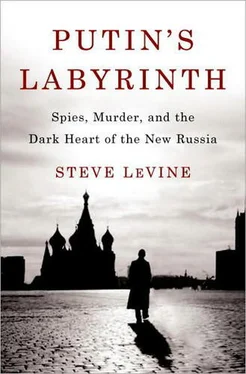The assault reduced the city to rubble, leaving behind only the carcasses of buildings. Grozny resembled scenes in photographs from World War II depicting the carnage of Europe.
At the end of January, Nana and I returned without Yura, and we began to visit outlying villages. The war had shifted there as the Russians widened their assault. Now there was a new wrinkle in the stories we heard. Oleg Orlov, a distinguished investigator with the Russian human rights group Memorial, provided cassette recordings and written depositions from people claiming to be victims of torture and witnesses to murder by Russian officers and soldiers. The statements were said to come from both Chechens and ethnic Russian citizens of Chechnya.
We set out to find some of these victims and, in the cattle-breeding town of Goity, met Isan Matayev, a forty-year-old truck driver. His family went back three generations there, but he was born in Kazakhstan, his family among those exiled to that land by Stalin in 1944.
Matayev described eighteen days of imprisonment by the Russian army. He and about thirty other Chechens and ethnic Russian civilians had taken cover inside a Grozny bomb shelter, then heard troops outside. “The Russians gave us a two-minute ultimatum either to open the shelter door or they would smoke us out,” Matayev said. “We opened the door, they checked us for weapons—none of us had any—and then they locked us back inside.” The next day, the entire group was loaded into an enclosed truck, hands cuffed behind their backs. Guards whom he described as towering men wearing masks ordered everyone to lie facedown on the truck floor in rows. Then more prisoners were ordered to lie on top of others until there were five layers in all, “like lumber,” Matayev said.
The truck hauled its human cargo seven hours north to Russian military headquarters in the city of Mozdok. En route, guards beat some prisoners with rifle butts and fired occasional gunshots. Matayev said one Russian man shouted that the troops “had no right” to shoot. The man was not heard from again. “I think he was shot, because he wasn’t among us at the end” of the journey, Matayev said.
At Mozdok, the captives were ordered out of the truck two at a time and made to step over the bodies of seven or eight men who had perished along the way, having suffocated or been shot. They were marched to a makeshift prison that, in the Chechen wars, became known as a “filtration camp.” It was ostensibly a way station for the Russians to separate Chechen fighters from mere civilians. The camp was that, but it also became a place where the Russians decided who would live and who would die. And that decision often was reduced to which captives’ relatives could pay the soldiers enough to win their freedom. Some who had no one to pay the requisite bribe disappeared without a trace.
Matayev was imprisoned in a compound consisting of two sets of railway cars fitted with blackened windows and grates, and surrounded by barbed wire. About a dozen soldiers guarded the yard, along with incessantly barking German shepherds. The guards regularly clubbed the men; when Matayev went to the bathroom, two soldiers beat him along the way.
During interrogation, a masked man randomly struck his feet, his back, and handcuffs that had been positioned over his knuckles—“wherever was convenient.” He was threatened with death: “Today is your death; we’re definitely going to do away with you tonight; enjoy your last few hours.” Matayev was released after relatives came up with enough money to free him and five others.
We left Matayev before dusk to make the long drive west to Nazran, in neighboring Ingushetia, where most correspondents were staying because Grozny had become too dangerous. Nobody wanted to be on the roads after nightfall, when nervous Russian solders seemed to shoot anything that moved.
The next couple of days, we visited villages where residents had signed pledges of neutrality in hopes that the Russians would not fire on them. At Achkhoi-Martan, a city dotted with large red-brick houses, local men armed with rockets, grenades, and assault rifles were lounging outside an office building. A local woman named Mariam Madiyeva, worried that they could attract hostile fire, shouted at them: “Go outside the village; don’t do this here. I am asking you on behalf of the mothers and children to leave.”
The neutrality pledges seemed to have dubious value. Mayor Abu Oshayev told us he was blindfolded and put in a flooded basement with other Chechen prisoners even after he had safely transported a wounded Russian officer to a Russian detachment. It was the very unit with which the mayor had negotiated the pledges.
“They were pushing us with the guns. They pushed us to our knees. Someone said, ‘Shoot the bandits. All of them are bandits,’” Oshayev recalled. “Then they hit a person kneeling next to me. He fell down and shouted, ‘Help me. Don’t kill me!’”
Oshayev’s ordeal finally ended when a Russian officer heard his account of assisting the wounded officer and ordered him released. “I told him, ‘If you treat us like this, those helping you, how are you treating the civilians who you don’t know?’” Oshayev said.
For the next few months, such stories were commonplace. It was tempting to dismiss them as the wages of war—there are excesses in all conflicts, everywhere. Yet this was something else—the Russians were not just trying to put down a rebellion. They were killing, attacking, and brutalizing anyone found on Chechen soil, including not only fighters for the resistance but also civilians and the elderly.
What crystallized events for me, however, was the arrival of the mothers. From across Russia, the mothers of young men conscripted by the Russian military to fight in Chechnya came to fetch their sons. I had seen similar scenes in Afghanistan during the late 1980s—Russian mothers, fathers, and wives arriving in search of husbands and sons captured by the mujahedin in the Soviet–Afghan war. But this was on Russian soil, not in a foreign land. This was their land. And the officers commanding their sons and husbands were on their side. Only, it didn’t always seem that they were. The angry mothers were responding to the scandal of green, ill-trained Russian soldiers being used as cannon fodder or otherwise abused and neglected by their own commanders. It wasn’t just the citizens of Chechnya who had been dehumanized by Russian indifference.
As with Chechen men who had gone missing, there was no telling where many of the Russian soldiers were. Many had been captured by the enemy. Some were prisoners at the Mozdok filtration camp—Matayev had observed a row of Russian deserters standing in a railcar, faces against a wall, being taunted by their Russian countrymen. “Do you want to be imprisoned with this group of Chechens, or that group of Chechens?” the guards shouted at the unhappy Russian conscripts.
There was one place to look for sure: The bodies of dozens of dead troops were kept in a freezer compartment in a morgue outside the war zone. But there was no systematic effort to identify the remains, and when we returned a year later, there were unclaimed corpses still stored there.
Carlotta Gall would go on to document the fighting, the brutality, and the blood thirst in her classic Chechnya: A Small Victorious War, which she wrote with our mutual friend Thomas de Waal. In the Second Chechen War, launched by Vladimir Putin as prime minister in 1999, the tough-minded Russian journalist Anna Politkovskaya wrote similar accounts in articles and books. She herself would be seized in Chechnya by Russian troops and threatened with rape and execution before finally being released.
At first, Muscovites seemed to react with genuine anguish to the ugliness in Chechnya. This was attributable to the Russian media, which provided saturation coverage, including much dispassionate reportage. But even the shocking stories of Russian soldiers mistreated by their own military didn’t seem to move many people; the main thing was to pay the necessary bribes so that your son was not conscripted or sent to fight there. Only the poorest, dullest, or most rural Russian youths seemed to end up in Chechnya.
Читать дальше












